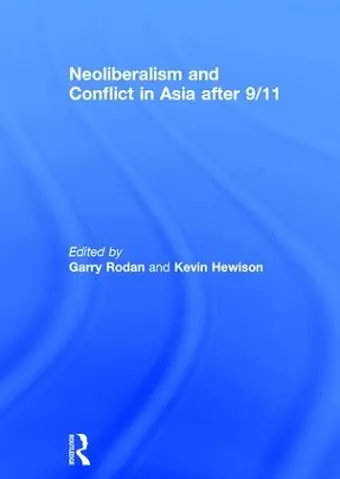Neoliberalism and Conflict In Asia After 9/11
Garry Rodan editor Kevin Hewison editor
Format:Hardback
Publisher:Taylor & Francis Ltd
Published:7th Dec '05
Currently unavailable, and unfortunately no date known when it will be back
This hardback is available in another edition too:
- Paperback£21.99(9780415568395)

Key events in Asia’s recent history have included the end of the Cold War, the Asian Economic Crisis and the ‘war on terror’. This is a critical assessment of these events, and of the interplay of security and economics in shaping political regimes and modifying market systems.
Based on the notion that market systems are inherently political and conflict-ridden, this collection clarifies and explains the conflicts shaping the path of neoliberal globalization. Collectively it represents a disciplined and systematic address of four overarching questions:
* What are the significant conflicts emanating from neoliberal globalization, and what are their implications?
* What are the implications of new security concerns for these conflicts, and what are their impacts?
* How are conflicts associated with globalization and security affecting social and economic policy directions?
* Can these directions be reconciled with the reproduction of existing political regimes, or do they threaten their basis?
In addressing these questions, the essays depict neoliberal globalization – in the new security context – as being able to accommodate a range of political regimes. This fascinating collection is a must-read for those with a professional interest in the region post-9/11.
This book was previously published as a special issue of the Journal Critical Asian Studies.
"The 12 essays presented by Rodan and Hewison examine social, economic, and political conflict in Asia at the current moment of neoliberal capitalism. The first group of essays, premised on the notion that market systems are inherently political and conflict-ridden, analyzes the changing nature of capitalist market systems in East and Southeast Asia. Topics in this section include the “securitization of US foreign economic policy in East Asia; debate over what constitutes Asian regionalism; and the relationship between international capital, Singapore’s state companies, and security. The next section focuses on forms of conflict involving domestic and political institutions and governance mechanisms for suppressing contestation of neoliberalism. Specific issues include rural land reform in China, neoliberalism and political alliances in the Philippines, Indonesian local party politics, and the political economy of developmental aid selectivity." --Reference & Research Book News
ISBN: 9780415373210
Dimensions: unknown
Weight: 612g
262 pages